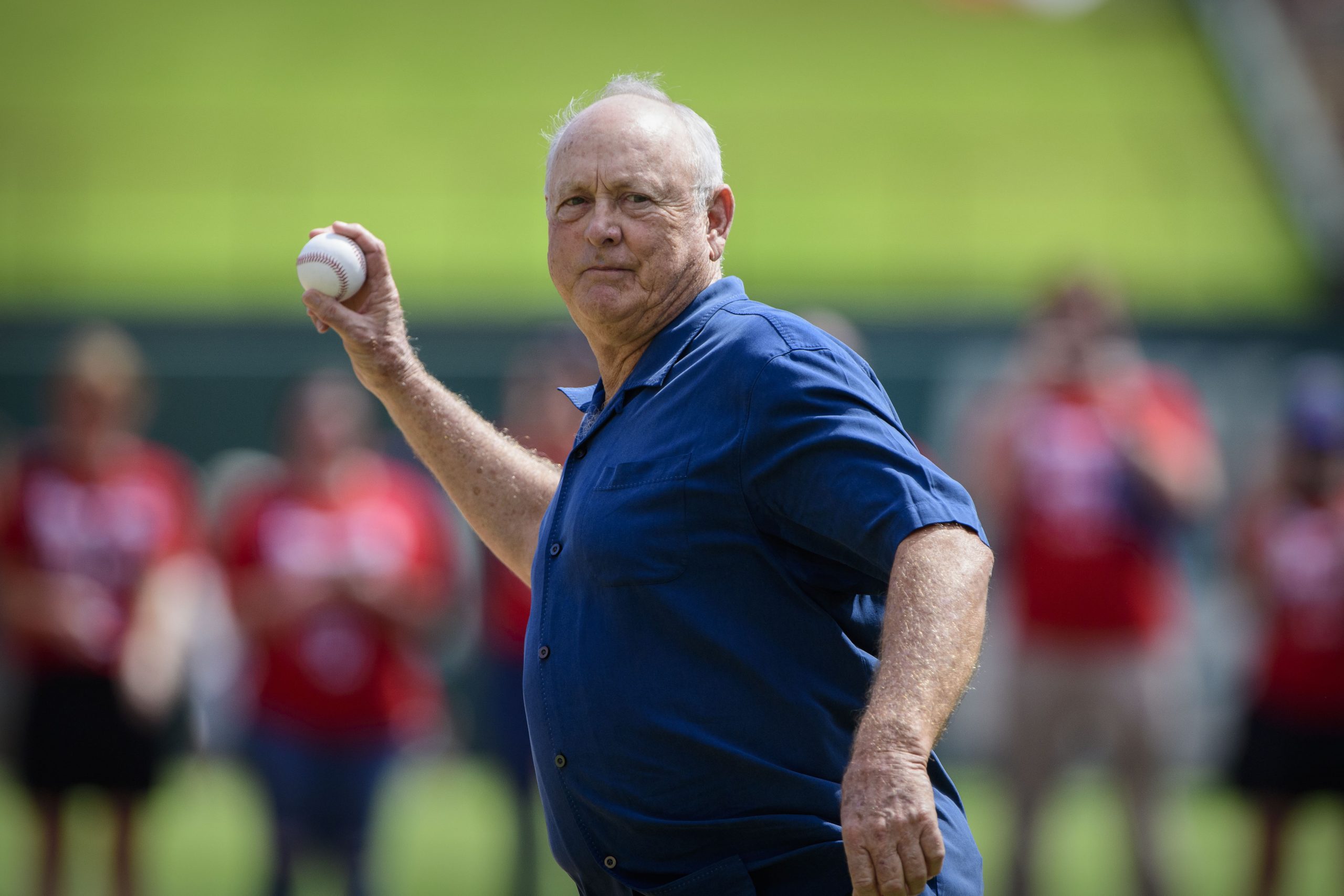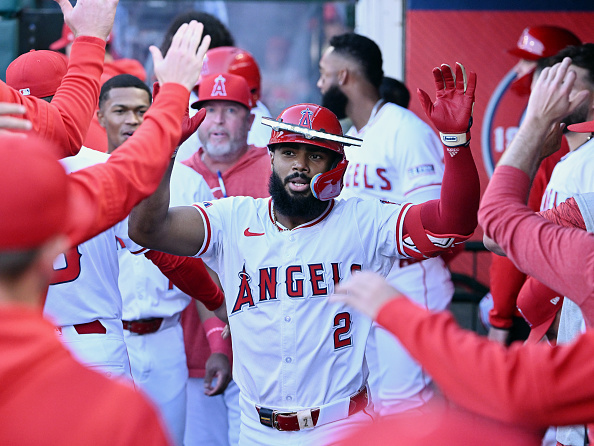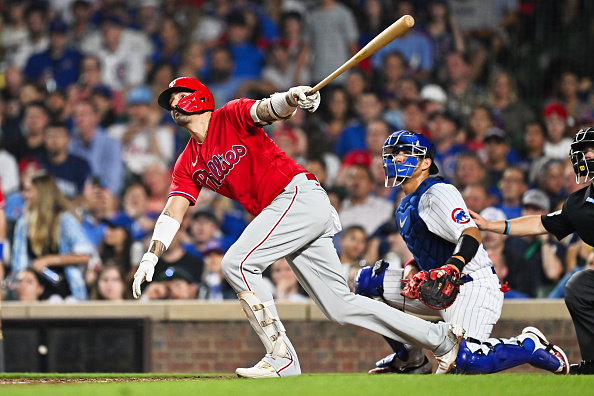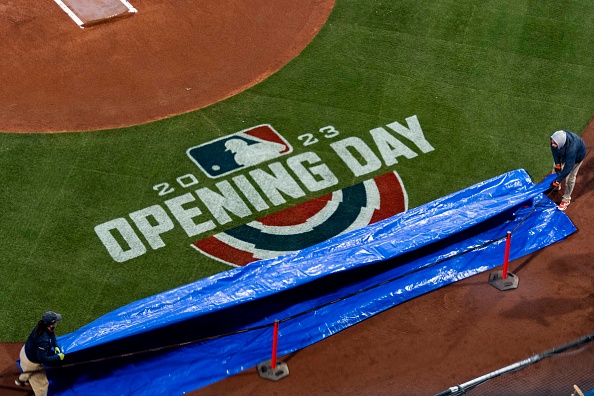As Los Angeles Angels baseball fans await the hopeful start of their franchise’s 60th MLB season, Prime Time Sports Talk is going back and compiling all-decade teams from the first six decades in club history. This week, the spotlight is on the decade that introduced Angels fans to “The Express”, Disco Dan Ford, Frank Tanana and ended with their first MVP and Western Division championship.
First base – Jim Spencer
Spencer, the Angels’ 11th-overall selection in the 1965 MLB draft, debuted for the Halos in 1968 and by the 70’s, was the everyday first baseman. 1970 was a breakout season for Spencer, hitting .274, 12 home runs, and driving in 68 runs while earning his first AL Gold Glove award.
Spencer would earn a spot on the American League All-Star team in 1973 and finish his tenure with the Angels with final season totals of a .249 average, 33 home runs, and 152 runs batted in during the decade with the club. Honorable mention to Bob Oliver as close runner-up to this position on the squad.
Second base – Bobby Grich
Bobby Grich holds the second base position for the decade over Sandy Alomar based on Grich’s offensive production and greatness in the field. While Alomar played 661 games compared to Grich’s 349 with the club, Grich’s 10.0 WAR, .269/.362/.431 slash compared to Alomar’s 6.5 WAR and .248/.296/.292 line.
Grich wrapped up the decade with one of his finest seasons in 1979 when the All-Star hit .294 with 30 doubles, 30 home runs, and 108 runs batted in as catalyst for the division-winning club and finishing eighth in AL MVP voting.
Shortstop – Dave Chalk
Jim Fregosi opened the decade as the Angels starting shortstop and earned All-Star honors before being dealt to the New York Mets for a right-handed pitcher from Alvin, Texas. Chalk quickly earned the starting spot at shortstop and was named to two All-Star teams (1974 and 1975) during the decade. Chalk played over 300 games at short while splitting the majority of his Angels career between shortshop and third base.
Third base – Ken McMullen
Carney Lansford burst onto the scene for the Angels in 1978 and provided great spark in Angels lineup to close the decade but Ken McMullen’s Gold Glove-caliber performance at the position between 1970 and 1972 earn third base honors. The nine-year veteran McMullen joined the Halos in 1970 hitting .251 with 44 home runs, 163 runs batted in during his three seasons with the Angels. His range statistics at the position were among the top-five in league during his tenure with the club.
Left field – Don Baylor
Don Baylor has the reputation of being the first designated hitter to win the MVP award during his 1979 season; however, Baylor actually played 78 games in left field that season compared to 65 games as the designated hitter. He joined the Angels in 1977 and hit .269 with 95 home runs and 313 runs batted in the final three years of the 70’s capped off by his lone MVP season. Baylor earned the franchise’s first Most Valuable Player award that season hitting .296 with 36 home runs, and a league-leading 120 runs scored along with 139 runs batted in.
Center field – Mickey Rivers
Mickey Rivers broke into the majors with the Angels in 1970 and was really only a fourth outfielder for the team until becoming the everyday center fielder for the team in 1974 hitting .285 while leading the American League with 11 triples in addition to 30 stolen bases.
In 1974, Rivers would shatter that record, swiping a league-leading and still club-record 70 bases while hitting .284 and leading the league for the second straight season with 13 triples. The Angels would trade Rivers to the New York Yankees following the season in exchange for Bobby Bonds.
Right field – Bobby Bonds
Bobby Bonds came to the Angels at the high price of Mickey Rivers and Ed Figueroa and while his power production lacked during his first season with the club in 1976, he more than made up for it the following season.
Bonds would hit .264 with 37 home runs, and 115 runs batted in while stealing 41 bases for the Halos. Bonds became the first “30-30” player in franchise history while falling just three home runs shy of beginning MLB’s first “40-40” player.
Catcher – Brian Downing
The acquisition of Brian Downing before the 1978 season gave the Angels a catcher that provided offensive prowess like no other backstop during the decade. Downing hit a decent .255 with seven home runs, and 52 runs batted in across 133 games his first season with the Angels.
It would be his 1979 season that proved to be his breakout one. The 28-year-old Downing appeared in his first All-Star game that season hitting .326 with 12 home runs and 75 RBIs while finishing 14th in the AL MVP voting behind his winning teammate Don Baylor.
Designated Hitter – Frank Robinson
While Don Baylor appeared in 228 games as designated hitter during the decade, he still played 215 in the outfield, allowing Frank Robinson to earn DH honors on this squad. Robinson served as the Angels DH in 250 games across the better part of two seasons with the California Angels in 1973 and 1974. Robinson hit .266 with 30 home runs and 97 runs batted in for the Angels in 1973 while he was an All-Star for the Angels in 1974 and hit 20 home runs with 63 runs batted in. Eight years later, Robinson would be the first former Angels player inducted into the Baseball Hall of Fame class of 1982.
Utility Player – Ron Jackson
Ron Jackson broke into the majors with the Angels in 1975 and found himself playing all four infield positions, the corner outfield spots, and designated hitter until he was traded to Minnesota for Dan Ford following the 1978 season. Jackson would return to the Angels in 1982 and play three more seasons for the Angels.
Starting Pitchers – Nolan Ryan, Frank Tanana, Clyde Wright, Andy Messersmith, Bill Singer
Nolan Ryan struck out 2416 would-be hitters across 1854 2/3 innings during his eight seasons playing in Anaheim. That’s greater than 500 strikeouts more than he recorded for Houston across nine MLB seasons. Ryan threw a record four no-hitters and ended the 1973 season with a still-record 383 strikeouts for the year. The five-time Angels All-Star would lead the league in strikeouts in seven of his eight seasons with the club, recording years of 329, 383, 367, 186, 327, 341, 260, and 223 strikeouts before leaving to sign with his home state Houston Astros in 1980.
Frank Tanana is one of the greatest Angels pitchers of all-time but played his Angels career in the shadow of Nolan Ryan. After Tanana’s big-league debut with the Angels late in the 1973 season, he became a fixture in the Angels rotation with his 269 strikeouts in 1975 leading the league (the only season Nolan Ryan didn’t during his Angels career.) Tanana was a three-time All-Star and finished his Angels career in 1980 with a 102-78 record with a 3.08 earned run average having struck out 1233 hitters across 1615 ½ innings for the Angels
Clyde Wright began his Angels career in 1966 but made his first All-Star game with the club in 1970 winning 22 games for the Halos that season. Wright would go on to have seasons of 16 and 18 wins in 1971 and 1973 before winning 11 in his final Angels season of 1974.
Andy Messersmith entered his third season with the Angels in 1970 winning 11 games with a 3.01 ERA for the club that year, but it was his 20-win All-Star season of 1971 that was the peak for the right-hander. Messersmith would finish his Angels career with 59 wins before being traded to the Dodgers.
Bill Singer was acquired from the Dodgers for Andy Messersmith and immediately served the Angels well, striking out 241 batters and winning 20 games in his 1973 All-Star season with the Halos.
Relief Pitchers – Dave LaRoche and Mark Clear
Dave LaRoche broke into the majors with the Angels in 1970, was dealt away in 1972, only to return to the club in 1977. LaRoche’s 61 saves for the Angels during the decade were 40 more than the next pitcher. He also won 32 games for the club across 251 games coming out of the Angles bullpen.
Mark Clear’s 1979 11-win All-Star rookie season were enough to give him the edge over other early-decade relievers Lloyd Allen and Ken Tatum. Clear finished third in the AL Rookie of the Year voting and would replicate the feat of 11 relief wins during his sophomore season before being traded to Boston.
Manager – Jim Fregosi
The legendary Angels shortstop returned to Angels to manage in 1978 winning 62 and losing 54 after the firing of Dave Garcia. The next season, Fregosi would lead the “Yes We Can” Angels to their first post-season as the club would win 88 games and finish three games ahead of Kansas City.
See additional Angels All-Decade rosters: 1960’s, 1980’s, 1990’s








One Response
Was Charles F. LeBrun a scout in the 60s or 70s. But I know he was a tipple A pitcher since 1947?